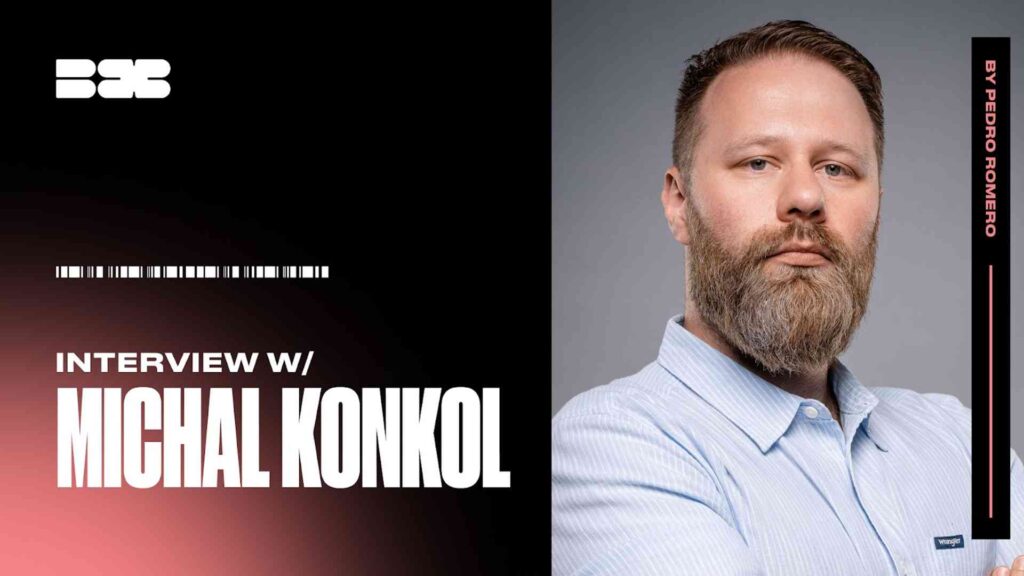By this point in time, esports has seen far more than a bevy of players and teams make a name for themselves in the title they choose to pursue. Through seemingly endless bouts of struggle and hardship, some eventually manage to finish their journey in championship glory whereas the rest fall in defeat at their own expense. Whatever the case may be, their contribution serves as the continuation of the general esports community, thus extending it all together.
One way to commemorate the existence of those responsible for continuing the scene is through photography. Photography adds depth and context behind a particular moment that corresponds to a player and helps viewers understand the immensity surrounding it. In its own static way, photography has the power to immortalize someone or something within the realm of esports. Of those who distinguished themselves as one of the best esports photographers around is MichaÅ Konkol.
After moving to esports from working in marriage ceremonies, Konkol became one of the scene’s leading photographers, even going so far as to become the lead photographer of the LEC, Europe’s foremost professional League of Legends competition. Additionally, he works in other prominent titles such as Counter-Strike: Global Offensive, Valorant, Rocket League, Rainbow Six: Siege, and many more.
It’s a career that continually demands the most out of Konkol in the physical and mental departments. Oftentimes he works two or three events in quick succession with no break in between. To that extent, one may go so far as to compare the workload as similar in magnitude to what the very players they’re covering go through, which Konkol can’t help but agree with.
Even so, with all things considered, Konkol wouldn’t change a single thing in his mind about deciding to pursue esports photography. After experiencing various obstacles in his career, he remains steadfast in continuing his career unabated.
Just before starting his latest gig in the BLAST Premier: World Final in Dubai, United Arab Emirates, Konkol spoke to BLIX.GG about his career thus far, what it was like to navigate past the COVID-19 pandemic when virtually every esport moved to online capacity, being the lead LEC photographer, and much more.
Pedro Romero, BLIX.GG: You’ve had a pretty busy schedule this year as an esports photographer, covering many events for different games. How have you navigated throughout this year in particular?
MichaÅ Konkol: I know it’s going to sound very cheesy but if you don’t have a person that supports you, then you’re probably not going to be able to actually do this. As a little background, I am married and have two small kids. That’s a challenge in and of itself from the very beginning. But family aside, I like to say that I have a very good relationship with a lot of game developers and event companies.
Having them in constant contact in a good amount of time in advance, I think, is the biggest culprit on why I and a lot of my photographer friends were able to navigate throughout this year which was the craziest so far. I have a strong feeling a lot of companies are trying to get back what they lost from 2020 and 2021 due to the pandemic so there’s a lot of events going on right now.
Impact of the pandemic
BLIX: You mentioned how difficult it was for you to navigate through the COVID pandemic. How were you then able to overcome that obstacle mentally after working through the pandemic?
Konkol: Honestly, I still remember the date. It was Friday the 13th of March in the LEC studio. I came in like every other week and half an hour before the show starts, we all gathered in front of the stage and the head of Riot Europe said, ‘Guys, we’re canceling the event today. Please go back to your homes. We will most likely have a two-week off period but if all goes well, we should be back.” For me and my brothers and sisters in arms, when it comes to photography, it was like hitting a brick wall because, literally from one day to the other, everything got canceled. For me, it was super hard because no one knew what was actually happening. We were wondering when will we be able to get back to work and do what we love. On top of that, the LEC studio is in Berlin and I live in Poland so I drive every single week to Germany, and in the first three or four months, you couldn’t travel because the borders were closed. That was a very new experience for me. I’ve been through a lot of rough stuff in my life, but this was by far the hardest one to overcome. And as I said at the beginning of our talk if it wasn’t for my wife–and I know it sounds cheesy, but it is the truth–I don’t know if I would’ve made it. In all honesty, it was so tough mentally.
BLIX: We’ve seen a good resurgence of the scene with all the obstacles it experienced within the past few years. Do you feel this year in particular has been the most difficult in your career?
Konkol: It’s honestly not that difficult. I started my entire career in esports photography with Riot and I’m very grateful to them for actually giving me a shot. I always try to pick any additional work, so it doesn’t coincide with, with LEC, MSI, Worlds, and so on. That’s kind of been the thing for everyone. It’s been a very challenging and long year.
Literally, myself and Stephanie Lindgren are finishing up our year of events here in Abu Dhabi for the BLAST Premier: World Final. After that, speaking for her and myself, we’re just going to home, hang our cameras on a hook, and not touch them until next year.
BLIX: You’ve been the lead photographer for the LEC for a good amount of time. How have you dealt with the responsibility of being the head of the LEC photography team?
Konkol: In all honesty, I don’t really like that terminology of being the lead photographer. Yes, I have it in my bio but that was kind of the thing Riot suggested me to do. I’ve been working with Riot on EU LCS and LEC since that big move from Cologne to Berlin. And are there any difficulties? I really want to say no. If there are, then they are so minor I don’t even think of them as obstacles or anything like that.
I don’t know if it sounds logical in any way, but working with so many talented people that are involved in creating what is the LEC and League in general in Europe, every single time I come to the studio, I’m greeted like a member of the family. There are always a lot of hugs and discussions about what we’ve done besides LEC and so on so it is a very family atmosphere.
You don’t feel like you’re going to work if that makes sense, but it’s such a cool environment. I hate to call it work even though it is.
BLIX: What do you specifically focus on when it comes to taking pictures of players or talent during events and how has that differed from when you started up until now?
Konkol: To be fair, I don’t think it changed all that much. I have maybe a little unorthodox approach to photography when it comes to events. It’s a style other photographers have in similarity but a lot of them are only focusing on getting the best shot from that event. It has to be that epic, iconic shot. Yes, that is important, but there is an entire event behind it. I always try to tell a story with my photos.
I always start outside the venue with the queues and try to interact with the audience. I want to tell the story of the event and not of a specific player or team. I try to do my best and show off how the event went. That’s kind of coming from my previous background which was wedding photography. In wedding photography, you’re telling a story of that specific day. You don’t focus just on the bride or the groom. You focus on every single time in detail that creates a full picture of that day. That is kind of my approach to esports photography.
Of course, I am trying to get “the shot” of the event, but I’m not going to kill myself or anyone or just to get it. We are there working as a team so I’m fine with covering the grand aspect of the event and if someone wants to hunt for that specific shot, then by all means. I’m a team player. I always believe in playing as a team. The thing about esports photography is to work as a team and deliver a compelling and full picture of the whole event. That’s what I love about it.
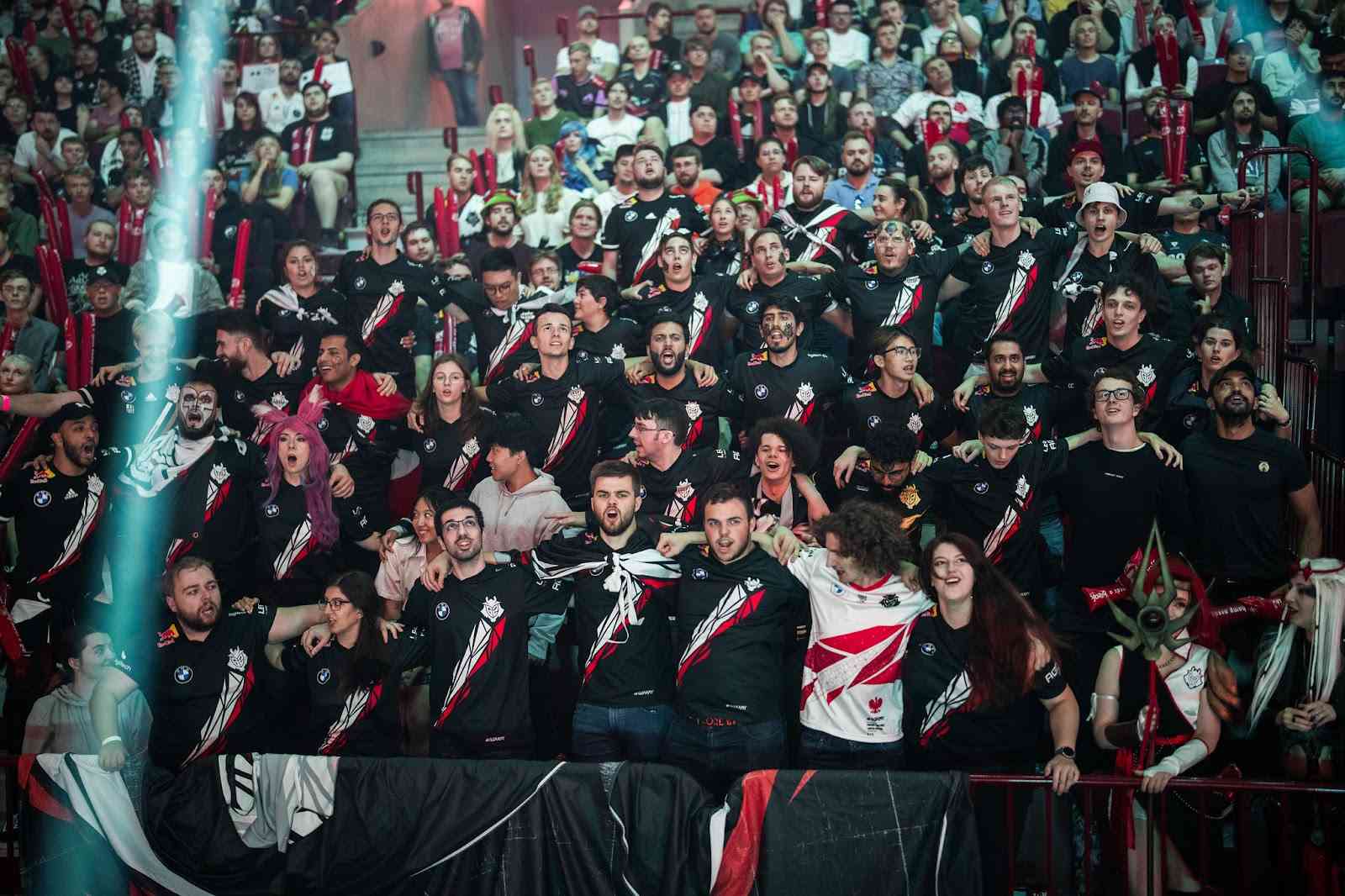 G2 Esports fans celebrate during the LEC Summer Split 2022 finals
G2 Esports fans celebrate during the LEC Summer Split 2022 finalsBLIX: Taking that into consideration, has that aspect differed in any game that you’ve covered throughout your career (CS:GO, Rainbow Six, etc.)?
Konkol: I don’t think it differs for me. I approach every event on the same mindset. I want to show off the entire event, not just the stage and the players. The thing that a lot of people are missing is that without the fans, there would be no esports. We got a taste of that during the pandemic. The people did watch the online events because they had nothing to do, but it wasn’t the same. Everything when kind of sideways. I don’t like using bad words but s**t hit the fan, you know?
When we went fully online, the whole esports experience got hit in such a spectacular way. We were missing the interactions between the players and the cheering from people literally traveling halfway around the world just to support their team or a very specific player. From my perspective, we owe it to the audience that are sitting in the venue to take as many photos of them as well because without them, there would be no stage and no esports.
From first days to favorites
BLIX: Who has been your favorite person to cover, work with, or take photos of?
Konkol: To be fair, it’s hard to say who is my favorite person either player or talent, but I’m going to tell you something different. My first day in EU LCS, I come into the studio, and I am absolutely terrified. I’m shaking. I had absolutely zero idea what’s going to happen and how I’m going to manage because I technically have no background in esports. However, the first person who came up to me and introduced himself was Quickshot.
We had like a five to 10-minute talk and he literally calmed me down. He said, ‘You got this. Don’t worry. If you have any questions, hit me up,’ and so on. From that point on, I really want to say that me and Trevor are very good friends still throughout all the years. I really owe a lot of my confidence probably to Trevor. I still talk about that to my fellow photographers. ‘Listen, the show is about to start. Let’s give it our best,’ and quoting one of my best friends, ‘don’t be s**t.’
That’s the quote Trevor says to every member of the talent team on LEC before the show starts. That’s kind of his trademark quote at this point. It’s so simple but it works so well that I actually borrowed it from him. Those three magical words: don’t be s**t. That’s it. It literally comes down to this: give it your best and don’t be s**t.
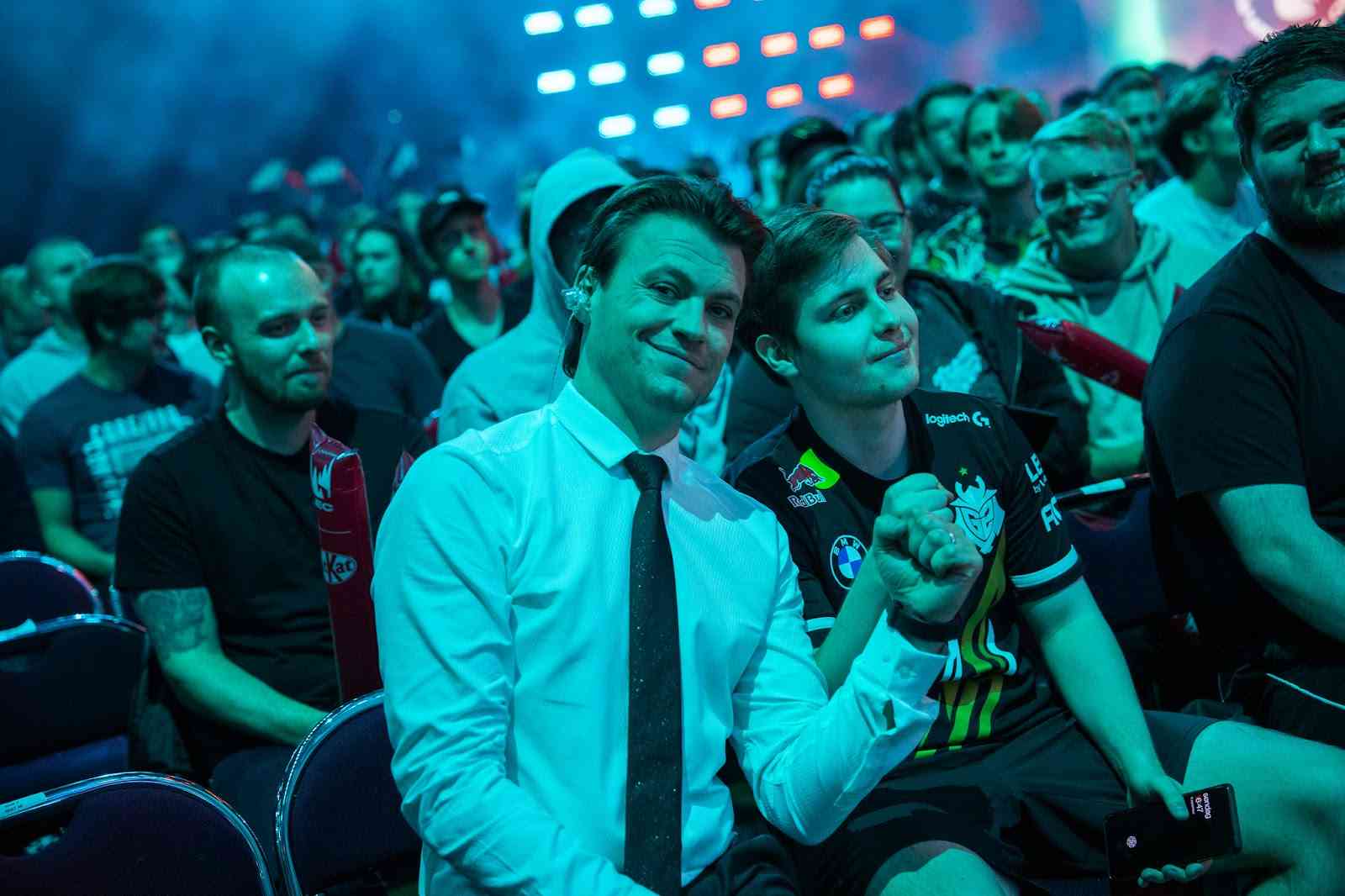 Quickshot, a prominent figure in the start of Konkol’s LoL esports photography career
Quickshot, a prominent figure in the start of Konkol’s LoL esports photography careerBLIX: Going by that same trajectory, which esports photographer has given you the biggest impression thus far in your career?
Konkol: I’m going to give you two answers. One: after my first week in EU LCS, I sucked. My photos were nothing like what Riot was looking for and I was f*****g terrified when the person who hired me reached back to me and said, ‘I know you gave it your best, but this isn’t really what we had in mind, so I’ll get back to you.’ I thought I blew it. That same day, I got another email which said I have to do my research before coming back to to the studio next week. I then started Googling esports photographers and, back in those days, there were around three or maybe four. The two people that I still look up to to this day are Helena Christiansen and Joe Brady.
I learned so much by looking through their work. Throughout a couple of days, I just looked at their photos and how they placed themselves within this whole chaos. It helped me in such an immense way that when I came back for the second week and I submitted my photos, the reply was, ‘That’s exactly what we were looking for. Keep it up. See you in the next set of weeks.’ In all honesty, those two names for me, at the beginning of my journey, were the single the most important influences that I could ever ask for. Currently, I would extend that list with Adela Sznajder and Stephanie Lindgren. Those ladies are just something different.
I absolutely love working with them because they’re true professionals. They have a very similar approach to photography as I do so that’s kind of a match made in heaven. My good friend Kirill Bashkirov and my brother from another mother Eric McNally, these are also my absolute GOATs when it comes to photography. Whenever someone asks me who they could hire in case I’m not available, I always send them the same list of people because I know they are amazing photographers.
BLIX: I’m going to throw you a pretty difficult question: which is your favorite esport that you’ve covered so far and why?
Konkol: That’s a curveball. I’m going to say this: my heart will always be with League of Legends. That is where I started. That is where I’ve spent the most time. That is where I have the most amount of friends.
League is so embedded in my heart I cannot imagine my life right now without shooting it. And when it comes to the brain, it’s actually tough and it’s going to be kind of an edgy one but it’s CSGO and Valorant. I, I can’t have one above the other. I know a lot of people are still in that thought process of thinking that Valorant is trying to compete with CSGO and vice versa, but no, it’s just not.
BLIX: Since you said it, I now have to ask. Which is your favorite: Valorant or CSGO?
Konkol: It’s like choosing your favorite baby. You cannot. [laughs] By a slim margin–like paper thin slim–CS just because we have more mature CSGO players. The age average in CS:GO is slightly higher and a lot of players right now are either married or having kids. They have their priorities figured out in life. But when they have the family life as their safe space, when they jump back into the game, they can show off the most powerful and raw emotions humanly possible. It goes the same for me in that regard.
I love esports photography, but when you go to the very basic element of it, it is a job. That is how I make money. That’s how I support my family and I think that’s the same thing. They have additional motivation to become the greatest because they have someone to do it for. It’s not just for them but they’re doing it for their families and loved ones. I know that might be going too deep but that’s kind of my approach to that.
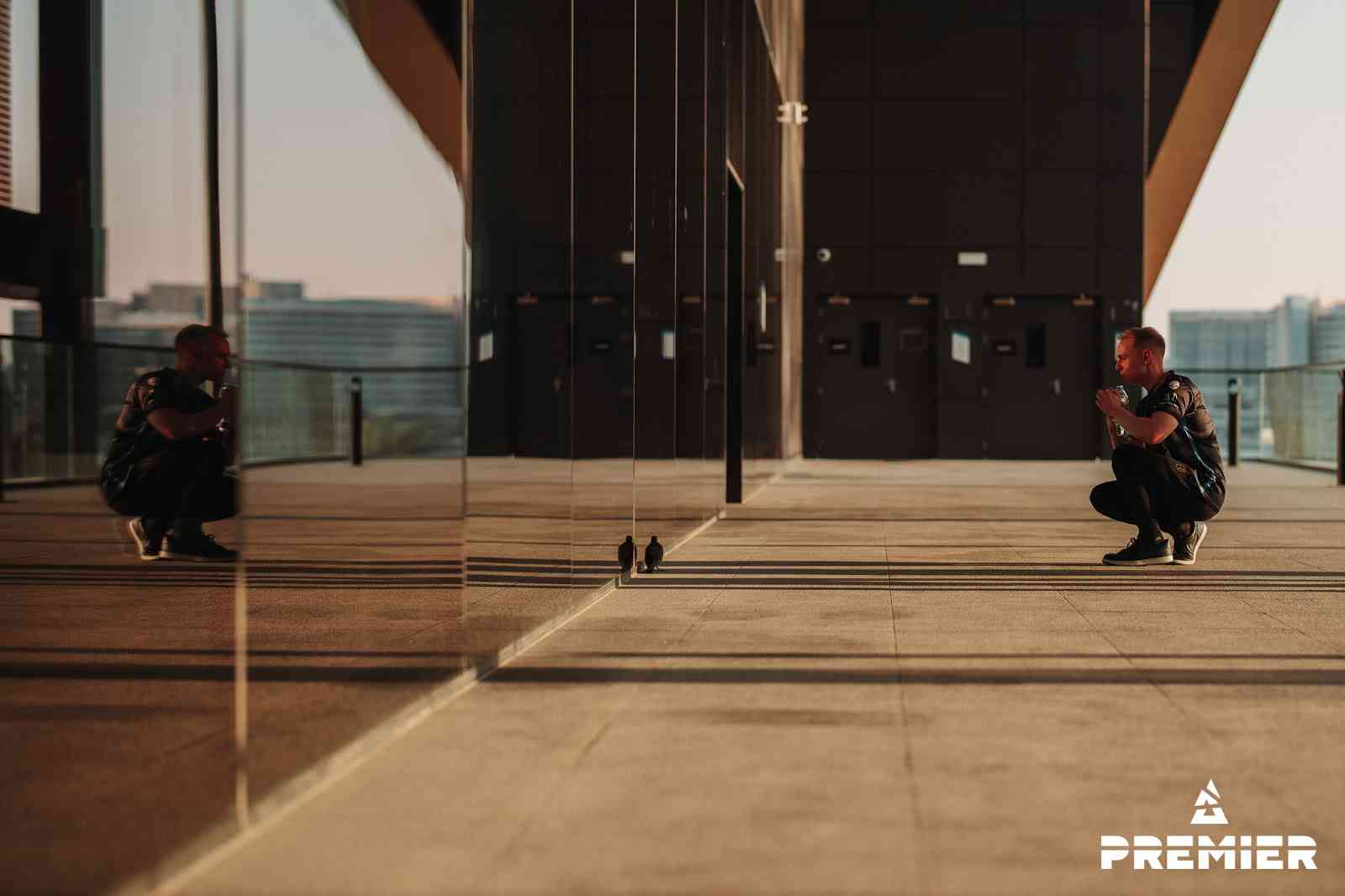 Jonathan “EliGE” Jablonowski during BLAST Premier: World Final 2022
Jonathan “EliGE” Jablonowski during BLAST Premier: World Final 2022
Konkol: I also believe we’re reaching a point in which we’re paying more attention to an individual during a major event than to the entire game or scene. It’s like we’re in the next phase of the scene’s maturity process. How does that factor in with esports photography?
I love catching those candid moments such as, for example, the wife, girlfriend, fiance, or parents are watching their son or daughter compete. Capturing how they are going through every single map and match, those people are the most hardcore fans. They’re the loudest people you will find in the arena. Not even the most hardcore fans will cheer as loud as your family. Those are the moments that I love to capture because esports photography is not only about shooting the stage. It’s everything.
BLIX: You mentioned in past interviews that your favorite photo that you’ve taken is Uzi touching the MSI trophy back in 2018. That said, what is your favorite photo that you’ve taken this year?
Konkol: I know it’s going to sound weird, but I don’t think I have a favorite photo from this year. Maybe I was so preoccupied I didn’t even have time to go through the photos and have a very specific one. This year, I decided to do a lot more work to extend my knowledge when it comes to studio photography because that’s also a very important element of esports photography since we have media days. Sadly, a lot of players don’t really like it but oh well, it has to be done. I do like my photo of Twistzz from FaZe.
Konkol: It’s kind of like a tradition for us at this point. I am a sucker for tattoos and I like to show it off on players because it has a meaning to them. Going back to that storytelling part of me, why hide your tattoos if you decided to get a piece of art on your skin? Let’s show it off in the best way possible.
I have two photos from Rocket League from the London Major. Rocket League was something that I always wanted to shoot and, oh my god, it’s so fun. It is one of the most difficult titles to cover because you have absolutely zero clue on what’s happening and everything can flip upside down in a matter of seconds.
BLIX: And it goes by much faster than any other title.
Konkol: At some point, during the London Major, I thought I found the perfect formula of utilizing the crowd because it would start cheering louder and louder for a team that would potentially score, but then at the finals, the crowd was shooting for everyone. So that idea didn’t work well. [laughs]
Normally in other games, you can see what’s happening on the screen, but as I mentioned, matches can go upside down in a matter of seconds. That is actually the one game where you have to trust your gut and be extremely lucky, but that’s maybe why I loved it so much because it was a new challenge. I had to decipher the code of how to get good photos from that event, but it was hella fun.
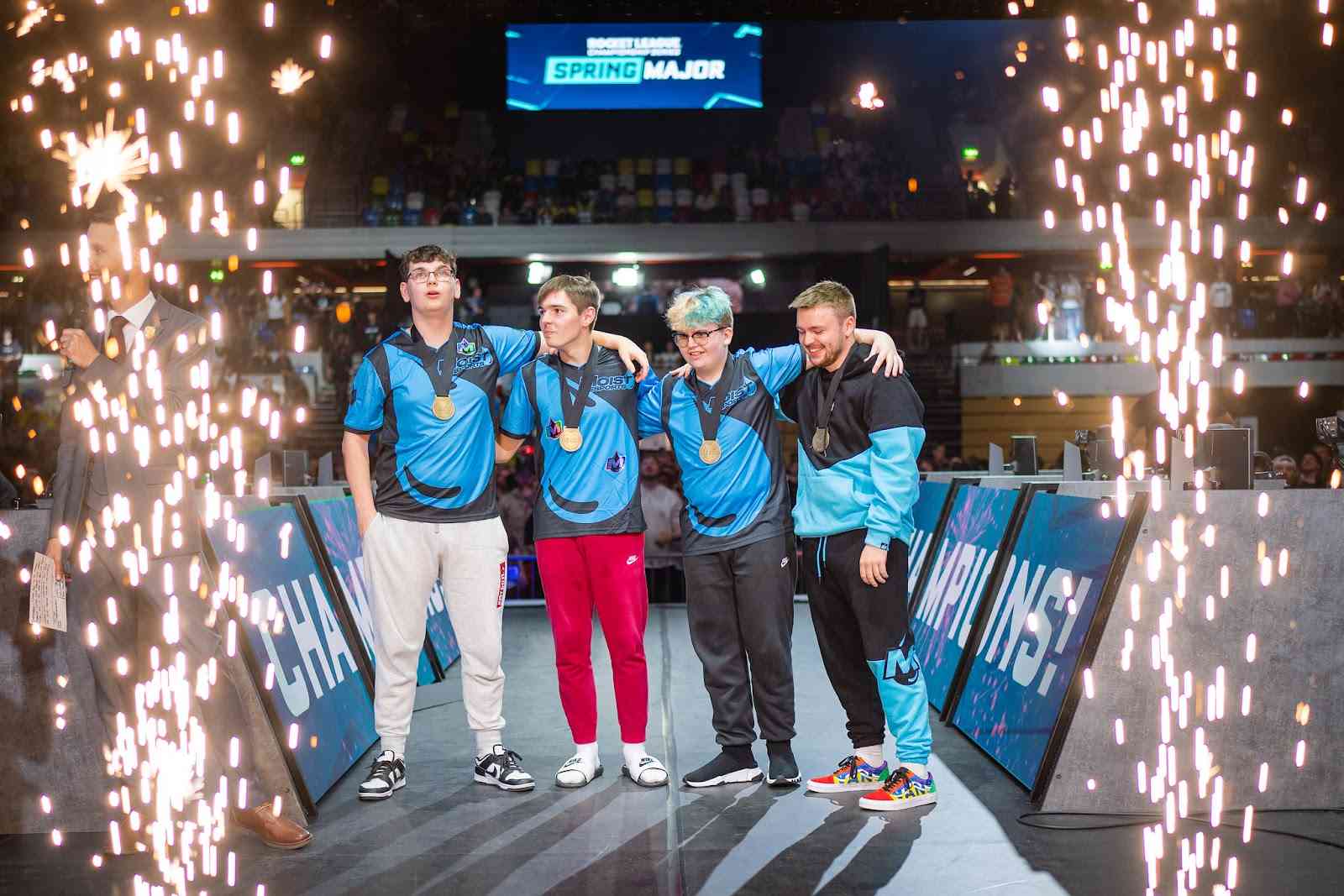 Moist Esports winning the 2022 RLCS Spring Major
Moist Esports winning the 2022 RLCS Spring MajorSome words of wisdom
BLIX: As a veteran photographer in the scene, what has been the biggest adjustment you had to make from when you started working? And what has been the most difficult part you have to work through?
Konkol: What I’ve learned that helps a lot is the more you know about the game itself, the more it helps. When I started in 2015, I literally played five games in my entire life. Afterwards, after two to three weeks, I thought to myself what was actually going on. I started asking the casters and analysts, ‘Can you give me some hints on when I can expect something?’
I need to be able to anticipate a lot of those things. Actually, my godson, he was maybe 13 or 14 at the time, he took the time and taught me the basics of the game, and from that point on, I spent a lot of time with casters, analysts, and players and kept asking them very basic, very stupid questions. Still, that helped me a lot because I can now anticipate by just looking at the game in which state it’s currently in.
Knowing the game on a deeper level can actually help you with assessing if there’s going to be a team fight. Who has the higher chance of winning that team fight? Is that team fight relevant to the entirety of the game? That is stupidly helpful.
With CS, the basics of the game are very well known. I played the game when I was much younger during the time where it was still a mod for Half Life. When 1.6 came out, we played on our home LAN parties so I still remembered the basics of the of the game. I just had to learn the tournament rules.
On top of everything, what I like to do is do a lot of research. When I approach a tournament, I watch a lot of VODs of specific players and teams that played in previous events. I literally have a little black book with notes on all of the players that asseses things such as who has the most explosive character and who is the most proned to show emotions. I like to do my research so that also helps a lot at least for me.
I don’t have to go trust my gut or just beg for a lucky lmoment. I can assess what’s happening and be prepared to capture the moment of that specific player. I also know most of the players that either have their loved ones who is coming or not. So yeah, that also helps me capture those moments that we talked previously about.
BLIX: In short words, what would be your advice for people looking to break in to the esports photography scene?
Konkol: Don’t be over eager. A lot of people want to get into esports for the wrong reasons. I know this is going to sound controversial, a lot of people adore a player or a team and they want to be able to be close as the photographers that they see on events and so on. But from the other perspective, if you want to start getting into esports when it comes to photography or videography, build your portfolio and know your equipment inside out. You do not have the time to think about the settings on your camera. That has to be done by muscle memory.
Go step by step. These days, a lot of schools are doing some kind of esports tournaments. Volunteer that you’re going to take photos of that and then gradually go higher from that. Some of the best photographers out there right now started as volunteers. They did not even take photos. They just learned the ins and outs of how an event works. That would be the best advice that I can I can give. Take your time, build up your portfolio, build up your skill set, and eventually, you will get into the biggest events in the world.
There are so many events and so little really good photographers out there. And from day one, learn to work in a team. Don’t be an individual, be a team player.
All Images: Michal Konkol


